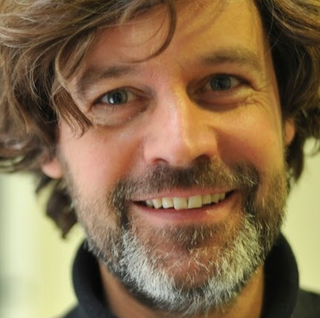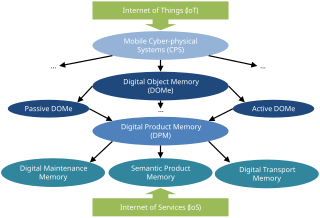Related Research Articles

Heraclitus was an ancient Greek pre-Socratic philosopher from the city of Ephesus, which was then part of the Persian Empire. He exerts a wide influence on ancient and modern Western philosophy, including through the works of Plato, Aristotle, Hegel, and Heidegger.
Radio-frequency identification (RFID) uses electromagnetic fields to automatically identify and track tags attached to objects. An RFID system consists of a tiny radio transponder called a tag, a radio receiver, and a transmitter. When triggered by an electromagnetic interrogation pulse from a nearby RFID reader device, the tag transmits digital data, usually an identifying inventory number, back to the reader. This number can be used to track inventory goods.
Traceability is the capability to trace something. In some cases, it is interpreted as the ability to verify the history, location, or application of an item by means of documented recorded identification.

Robert Sedgewick is an American computer scientist. He is the founding chair and the William O. Baker Professor in Computer Science at Princeton University and was a member of the board of directors of Adobe Systems (1990–2016). He previously served on the faculty at Brown University and has held visiting research positions at Xerox PARC, Institute for Defense Analyses, and INRIA. His research expertise is in algorithm science, data structures, and analytic combinatorics. He is also active in developing college curriculums in computer science.

The Auto-ID Labs network is a research group in the field of networked radio-frequency identification (RFID) and emerging sensing technologies. The labs consist of seven research universities located on four different continents. These institutions were chosen by the former Auto-ID Center to design the architecture for the Internet of Things together with EPCglobal. The federation was established in 1999; the network they have developed is at the heart of a proposal sponsored by EPCglobal and supported by GS1, GS1 US, Wal-Mart, Hewlett-Packard, and others to use RFID and the Electronic Product Code (EPC) in the identification of items in the supply chain for companies. The areas of expertise range from hardware to software to business research related to RFID.
Information Logistics (IL) deals with the flow of information between human and / or machine actors within or between any number of organizations that in turn form a value creating network. IL is closely related to information management, information operations and information technology.

Louis Pouzin is a French computer scientist and Internet pioneer. He directed the development of the CYCLADES computer network in France the early 1970s, which implemented a novel design for packet communication. He was the first to implement the end-to-end principle in a wide-area network, which became fundamental to the design of the Internet.

French Poets and Novelists is a book of literary criticism by Henry James published in 1878. The book collected essays that James had written over the preceding several years. From an early age James was fluent in French and read widely in the country's literature. These essays show a deep familiarity with the techniques and themes of many French writers. The book also includes an interesting essay on Russian novelist Ivan Turgenev, who James read in a German translation.
Liz McIntyre is a consumer privacy expert and founder of CAMCAT - Citizens Against Marking, Chipping and Tracking, an organization that works to prevent forced human tracking technologies like implantable microchips. She and co-author Katherine Albrecht wrote the RFID privacy book Spychips: How Major Corporations and Government Plan to Track your Every Move. At one time, McIntyre was the Communications Director for CASPIAN, an organization that advocated free-market, consumer-based solutions to the problem of retail privacy invasion.

Sanjay E. Sarma currently serves as CEO, President, and Dean at the Asia School of Business. Additionally, he holds esteemed titles as the Fred Fort Flowers (1941) and Daniel Fort Flowers (1941) Professor of Mechanical Engineering, as well as vice president for Open Learning at the Massachusetts Institute of Technology.

The University of Technology of Troyes is a French university, in the academy of Reims. The UTT is part of the network of the three universities of technology, found by the University of Technology of Compiègne. Inspired by the American University of Pennsylvania in Philadelphia, these three universities are a French mixture between the universities of this country and its schools of engineers .UTT is ranked in the top 10 engineering schools 2017 in France by Usine Nouvelle.
Mobile tagging is the process of providing data read from tags for display on mobile devices, commonly encoded in a two-dimensional barcode, using the camera of a camera phone as the reader device. The contents of the tag code is usually a URL for information addressed and accessible through Internet.
Network Centric Product Support (NCPS) is an early application of an Internet of Things (IoT) computer architecture developed to leverage new information technologies and global networks to assist in managing maintenance, support and supply chain of complex products made up of one or more complex systems, such as in a mobile aircraft fleet or fixed location assets such as in building systems. This is accomplished by establishing digital threads connecting the physical deployed subsystem with its design Digital Twins virtual model by embedding intelligence through networked micro-web servers that also function as a computer workstation within each subsystem component (i.e. Engine control unit on an aircraft) or other controller and enabling 2-way communications using existing Internet technologies and communications networks - thus allowing for the extension of a product lifecycle management (PLM) system into a mobile, deployed product at the subsystem level in real time. NCPS can be considered to be the support flip side of Network-centric warfare, as this approach goes beyond traditional logistics and aftermarket support functions by taking a complex adaptive system management approach and integrating field maintenance and logistics in a unified factory and field environment. Its evolution began out of insights gained by CDR Dave Loda (USNR) from Network Centric Warfare-based fleet battle experimentation at the US Naval Warfare Development Command (NWDC) in the late 1990s, who later lead commercial research efforts of NCPS in aviation at United Technologies Corporation. Interaction with the MIT Auto-ID Labs, EPCglobal, the Air Transport Association of America ATA Spec 100/iSpec 2200 and other consortium pioneering the emerging machine to machine Internet of Things (IoT) architecture contributed to the evolution of NCPS.

Josef Preishuber-Pflügl is an Austrian technology leader.
The ucode system is an identification number system that can be used to identify things in the real world uniquely. Digital information can be associated with objects and places, and the associated information can be retrieved by using ucode.

Alain Lefebvre is a French entrepreneur and author. He has made significant contributions to client server computing. He co-founded SQLI in 1990 and led the company for over ten years. Alain Lefebvre has published more than 29 books, five of which are about computer and internet topics. Since 1995, Lefebvre and his wife Murielle Lefebvre have been promoting Montessori education in France. He is the founder of the first professional social network in France, 6nergies.net. He has held network events, conferences, and was interviewed in 2004 about Web 2.0. He also published a book about social networks in 2005.

Olivier Mével is a French pioneer in the Internet of Things (IoT). Trained as an engineer, he is a serial entrepreneur and businessman with a passion for creating interactive web-connected objects. Mével is the co-inventor of Nabaztag, a Wi-Fi enabled ambient electronic device shaped like a rabbit.

A digital object memory (DOMe) is a digital storage space intended to keep permanently all related information about a concrete physical object instance that is collected during the lifespan of this object and thus forms a basic building block for the Internet of Things (IoT) by connecting digital information with physical objects.
Prajna Chowta is an Indian conservationist, wildlife researcher, writer and filmmaker specialised in the Asian elephant. She is the co-founder and managing trustee of the Aane Mane Foundation, founded in Bangalore, India, in 2000.

Dr. Erick Christopher Jones Sr. is an industrial engineer, administrator, and professor. He is an expert in radio-frequency identification (RFID), quality engineering, and Lean Six Sigma. Jones was the program director of The National Science Foundation's (NSF) Engineering Research Centers. He is currently Chair of the Supply Chain Technology Committee of International Supply Chain Education Alliance's (ISCEA) International Standards Board (IISB). Jones has worked in top positions in industry, government, and academia.
References
- ↑ (in French) "L'Internet des Objets... Internet, mais en mieux", foreword by Gerald Santucci, afterwords by Daniel Kaplan (FING) et Michel Volle, from main author Philippe Gautier and co-author Laurent Gonzalez, AFNOR editions, 2011 ( ISBN 978-2-12-465316-4)
- ↑ Independent from the one operated by VeriSign on behalf of EPCglobal